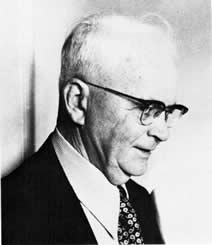

|

|
IN MEMORIAM
William Kendrick Pritchett
Professor of Greek, Emeritus
UC Berkeley
1909 – 2007
Kendrick Pritchett (as he was always known to his friends and to the scholarly world), emeritus professor of Greek in the University of California, Berkeley, died quietly at home on May 29, 2007, after a fall. He was 98. As professor of Greek in the Department of Classics and continuing well into his retirement, Pritchett built an impressive international reputation as one of the most prolific and innovative classical scholars in the U.S. He wrote more than 30 books and over 100 articles on a wide range of topics, including ancient Greek grammar and syntax, literature and historiography, topography, the arts of ancient warfare, religion and political institutions, chronography, and especially the study of inscriptions (epigraphy). He was also a revered teacher at all levels of instruction.
Pritchett was born in Atlanta, Georgia on April 14, 1909, and retained his Southern manners and accent for the rest of his life. He received an A.B. from Davidson College in 1929 and an A.M. from Duke University in 1930 before entering The Johns Hopkins University, where he gained the Ph.D. in 1942. From 1936 to 1942 he was research assistant in the Institute for Advanced Study in Princeton to the distinguished Greek epigraphist Benjamin D. Meritt, with whom he collaborated in publishing his first book, The Chronology of Hellenistic Athens (Cambridge, Massachusetts, 1940). At that time Pritchett also began to publish Greek inscriptions from the excavations of the American School in the Athenian Agora, thereby making his mark as a first-rate epigraphist.
Pritchett served with distinction in the U.S. Army Air Corps from 1942 to 1945, rising to the rank of captain. He was stationed first in the South Pacific and later in Germany, where he collected evidence for the Nuremberg Trials of the Nazi war criminals. After the war he returned briefly to Princeton before taking a teaching post at Muhlenberg College in Allentown, Pennsylvania. In 1948, Pritchett was appointed associate professor of Greek in the Berkeley Department of Classics, where he remained for the rest of his career, holding the rank of full professor from 1954 until his retirement in 1976. He was twice Annual Professor at the American School of Classical Studies and served on its Managing Committee from 1960 to 1976. He held a Fulbright Research Fellowship to Greece in 1951-52 and was awarded Guggenheim Fellowships in 1951 and 1955.
Pritchett was chairman of Berkeley’s Department of Classics from 1966 to 1970 and was the founding father, in 1968, of the Graduate Group in Ancient History and Mediterranean Archaeology, which has since won international recognition as the premier interdisciplinary program of graduate study in the field. He also helped to establish the California journal that has developed into Classical Antiquity. At his retirement, he received the Berkeley Citation, which celebrates both his preeminence in his field of scholarship and his outstanding service to the campus. Volume 8 of California Studies in Classical Antiquity was dedicated in his honor.
Through his numerous publications and innovative approaches, Pritchett became a highly regarded authority in Greek topography and ancient Greek warfare. His Studies in Ancient Greek Topography in eight parts (1965-1992), the fruit of numerous trips to Greece and intense fieldwork, set new standards for thoroughness and accuracy, often defending the veracity of the ancient historians against attacks from armchair pundits. Many of these excursions in Greece were in the company of fellow Hellenists and topographers Eugene Vanderpool and, later, John Camp. Through his teaching and research Pritchett had a deep influence on the choice of sites visited by students of the American School of Classical Studies on the fall trips.
Pritchett’s magisterial The Greek State at War, in five volumes (Berkeley, 1971-1991), explores all aspects of military engagement, including battle strategy and tactics, provisioning, soldiers’ pay, pre- and post-battle religious observances, the distribution of booty and a host of other topics; it has become the classic work of reference in its field. In 1976, the second volume of this great work received the Charles J. Goodwin Award of Merit of the American Philological Association.
Kendrick Pritchett was a combative scholar who flourished in the rough and tumble of scholarly debate. While still at Princeton, he published The Calendars of Athens (Cambridge, 1947) with Otto Neugebauer, a leading historian of ancient science at Brown University. Renouncing published views he earlier shared with his mentor, B. D. Meritt, Pritchett mounted a spirited defense of a lunar-observed calendar in ancient Athens and of the organization of the year of the Council of Five Hundred, as described by Aristotle in his Constitution of the Athenians. Meritt adopted a more flexible constitutional system and relied more heavily on the evidence of Athenian inscriptions. Hence was born a long and often bitter controversy between the two leading scholars in America on Attic time reckoning and inscriptions. It was to continue until Meritt’s death in 1989.
Pritchett’s many contributions to the field of Greek inscriptions, in which he broke new ground by involving geologists and pioneering novel methods, include his meticulous publication of the record of a public auction of the confiscated properties of Alcibiades and his associates, convicted of treason in Athens in 414 B.C.: The Attic Stelai in Hesperia (1953-1961).
Pritchett was married in 1942 to Elizabeth Dow, who died in 2000. She was the sister of the distinguished Harvard historian and epigraphist, Sterling Dow. Their one daughter, Katherine, died at a tragically early age. Pritchett is survived by his two grandchildren, Elizabeth Seavey Grajeda and Timothy Seavey.
At Berkeley, Pritchett is memorialized by an eponymous annual prize for the most outstanding student in elementary Greek—a course he taught regularly, a graduate fellowship, and a public lecture delivered by a distinguished visiting scholar.
Ronald S. Stroud
Erich S. Gruen
Donald J. Mastronarde